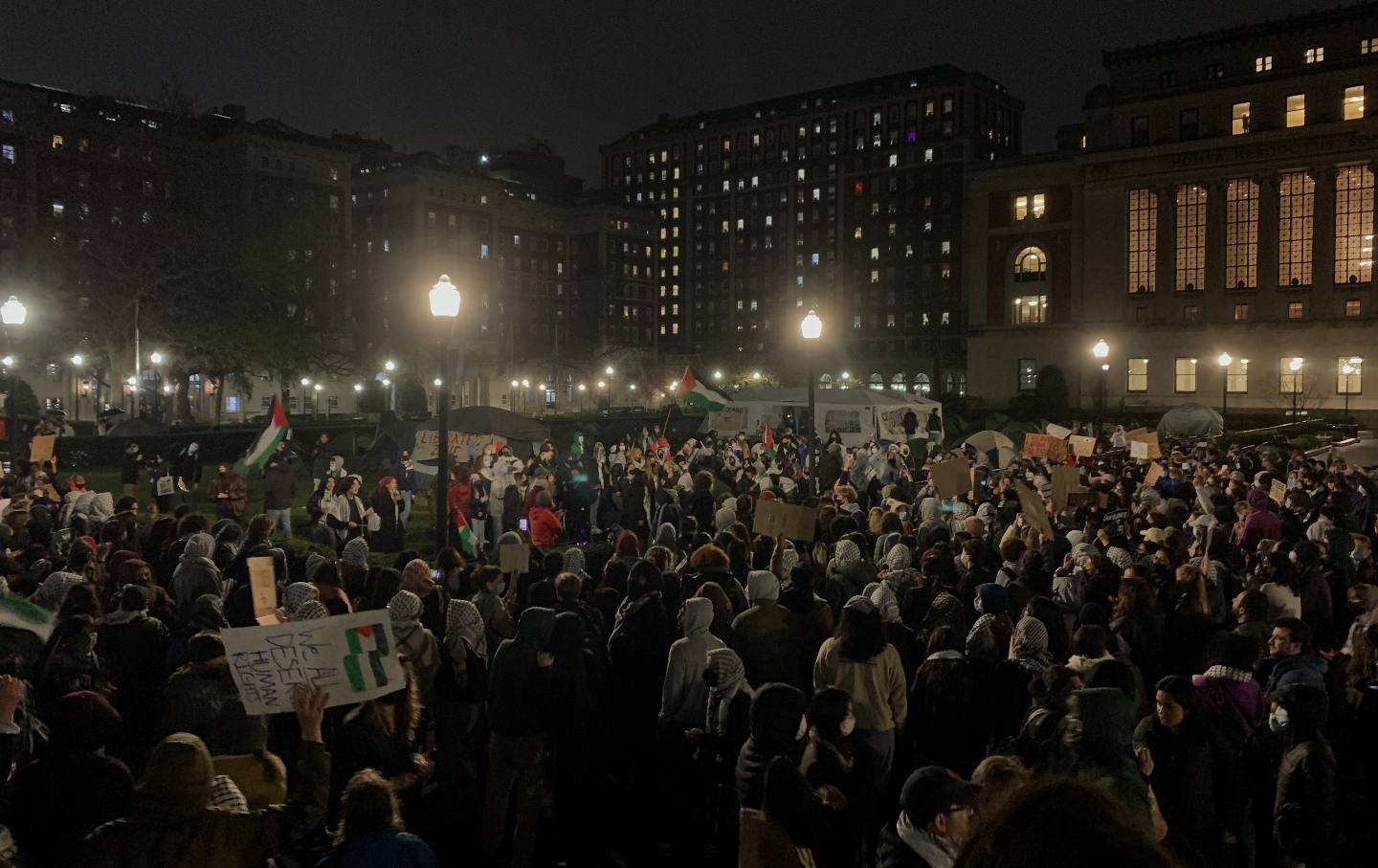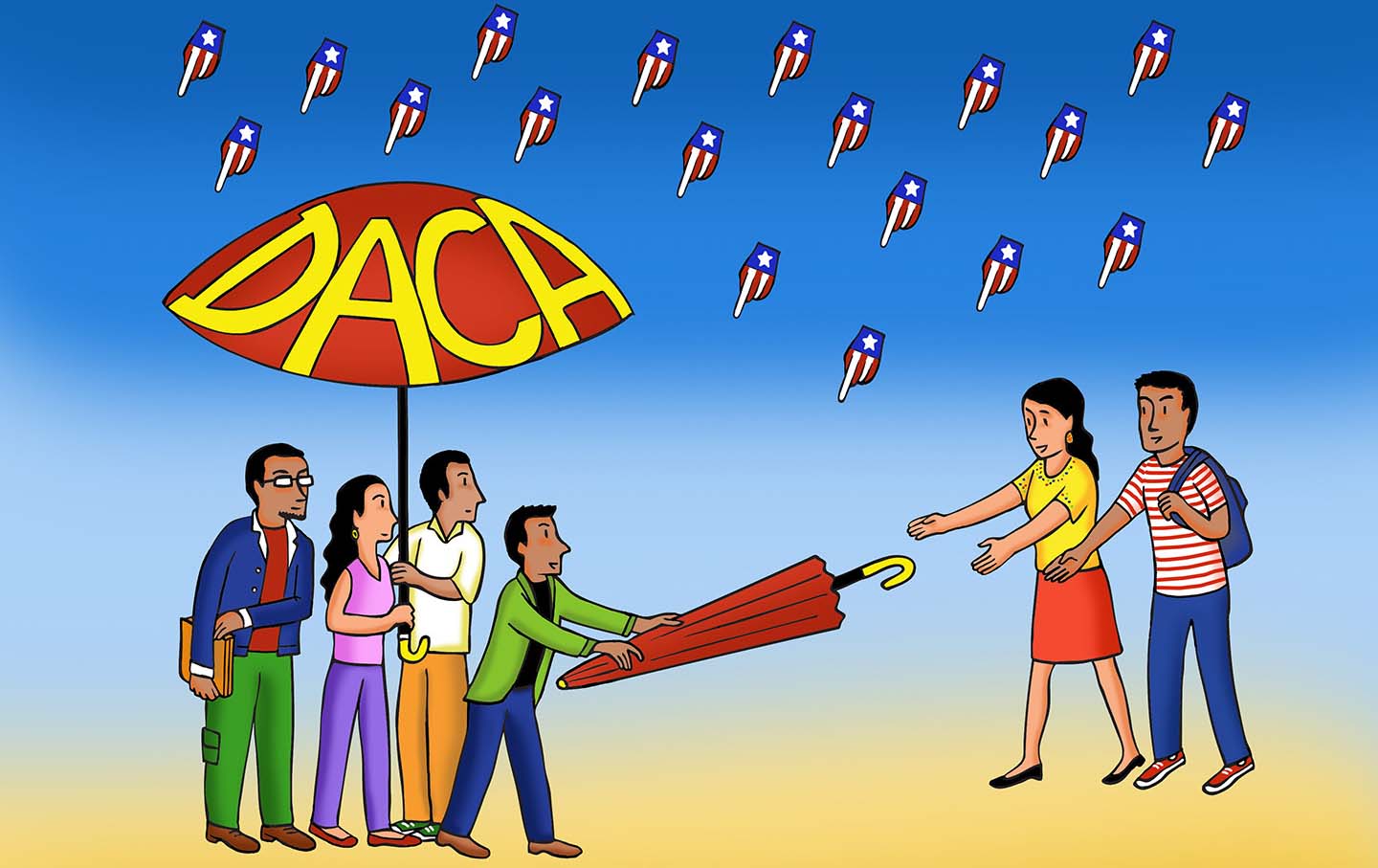
Left Coast
/
April 19, 2024
Students have every right to protest Israel’s actions in Gaza. But doing so at the home of a Jewish professor crosses a line.
The Berkeley School of Law on the University of California, Berkeley, campus.
(David Paul Morris / Bloomberg)
University of California, Berkeley, Law School Dean Erwin Chemerinsky has a storied record as a constitutional law scholar and an attorney willing to take on some of the hardest and most unpopular causes. In January 2002, he filed the first lawsuit on behalf of Guantánamo detainees, just days after the detention center opened. A few years later, he represented the family of Rachel Corrie—the young American woman who joined the International Solidarity Movement in support of Palestinian rights and was killed by Israeli Defense Forces in the Gaza Strip in 2003, shortly before her 24th birthday—in their lawsuit against Caterpillar, whose equipment was being used to demolish Palestinians’ houses in the Occupied Territories.
I first met Chemerinsky six or seven years ago, when we were both writing weekly columns for The Sacramento Bee on the Trump administration and its escalating assaults on the rule of law. We were also both, as a result of our writings, receiving death threats and other hate mail, on a fairly regular basis, from outraged denizens of the MAGA movement.
Recently, however, Chemerinsky and his wife, Catherine Fisk, also a UC Berkeley law professor, have become the target of an extraordinarily vitriolic and antisemitic campaign from some pro-Palestinian activists on campus and at the law school. Their offense? Not that Chemerinsky is pro-Netanyahu or that he’s spoken out in defense of the IDF’s actions on Gaza—he isn’t and he hasn’t, and in fact he told me this week that he abhors what Israel is doing in Gaza and opposes the blockade of food into the territory. But he has made statements in the past saying that he supports Israel’s right to exist. Activists have also called him out for not signing on to a Boycott, Divestment, and Sanctions demand, even though this is entirely outside his bailiwick: As dean of the law school, he has zero institutional say as to whether UC Berkeley, or the UC system more generally, divests from Israel.
Chemerinsky and Fisk have long opened up their home and their garden to host law school students at an annual dinner. This year, because the university was still playing catch-up after the pandemic years made such gatherings impossible, they agreed to host three dinners in quick succession for multiple years of students.
In early April, as the dinners were nearing, activists with a group called Berkeley Law for Palestine put up posters at the law school that showed a vicious caricature of Chemerinsky holding up a bloodied knife and fork. Chemerinsky also interpreted the image as showing his lips limned with blood. The caption, all caps, read, “NO DINNER WITH ZIONIST CHEM WHILE GAZA STARVES!” It would not have been out of place in Der Stürmer during the heyday of the Third Reich.
Chemerinsky has made a conscious effort to not make public statements on Israel and Gaza over the past six months, preferring, he told me, to focus instead on his areas of specialty, which mainly concern US constitutional law. Given this, it’s hard not to come to the conclusion that he was targeted with this ancient blood-libel imagery not because of his position on Israel, which he has kept largely private, but because he happened to be the highest-profile Jew in the neighborhood.
Current Issue

Days later, the activists disrupted the dinner by bringing in their own microphone and amplifier, and attempting to seize control of the gathering. When Chemerinsky, who is in his 70s, asked them to stop, to respect the fact that they were guests in his house, and to leave if they weren’t willing to join the dinner, they refused. When Fisk tried to grab the microphone away from the woman who was speaking, the student refused to cede the microphone. As the two women tussled for control, Chemerinsky continued to plead for the protesters to desist.
Finally, the group of 10 or so students left—but not before accusing Fisk of assault. Subsequently, they have called for the university to fire both Chemerinsky and Fisk and demanded that the police open an investigation. In the days since the events, each has been bombarded with grotesque hate mail. Fisk, Chemerinsky told me, has received messages like “you should die, fucking cunt.” Protesters have surrounded their house, banging drums and trying to disrupt their gatherings.
Anti-war protest is an American tradition, and Israel’s actions in Gaza, in the six months following Hamas’s murderous assault on October 7, are so brutal, the civilian death toll and the destruction of infrastructure so unrelenting, the food blockade so cruel, that they certainly deserve strong condemnation. But I fail to see how any of the events in Berkeley do one iota of good for Palestinians. I can’t for the life of me see how lobbing toxic, antisemitic messages and cartoons the way of a celebrated, and progressive, legal scholar advances the cause of the left or focuses attention on the awful acts carried out by the IDF in Gaza.
If this sort of action is deemed legitimate by progressives simply by virtue of the fact that Chemerinsky is Jewish and believes in the legitimacy of the state of Israel, then they are quite simply jumping the shark into the raw antisemitism of past mobs whipped up into an anti-Jewish furor in Tsarist Russia or Nazi Germany.
Chemerinsky’s worldview—his belief in Israel’s right to exist combined with a long history of respect for human rights and his disapproval of hard-right Israeli government policies and the behavior of settlers in the Occupied Territories—is similar to that of say, Albert Einstein or Isaiah Berlin, both of whom, I suspect, would draw the same ire from groups such as Berkeley Law for Palestine today.
It’s almost unfathomable for me that any self-described university progressives would glory in the vilification of any other ethnic or religious group. It’s certainly impossible to imagine the sort of ghastly caricature that was put up on the Berkeley law school posters being tolerated or even celebrated by members of the progressive community if it were aimed at a people other than Jews—or as the poster put it, “Zionists.” In fact, I’m fairly certain progressives, both on campus and in the world beyond, would demand the expulsion of any student who behaved in such a disgraceful manner against any other minority group.
“I think there’s been a change in discourse in this country,” Chemerinsky told me. “Trump, in ridiculing people—it legitimizes ugly discourse. I always assumed it was from the right. Now, for the left to be engaging in this ugly, hateful discourse, it’s just very frightening.”
Thank you for reading The Nation!
We hope you enjoyed the story you just read. It’s just one of many examples of incisive, deeply-reported journalism we publish—journalism that shifts the needle on important issues, uncovers malfeasance and corruption, and uplifts voices and perspectives that often go unheard in mainstream media. For nearly 160 years, The Nation has spoken truth to power and shone a light on issues that would otherwise be swept under the rug.
In a critical election year as well as a time of media austerity, independent journalism needs your continued support. The best way to do this is with a recurring donation. This month, we are asking readers like you who value truth and democracy to step up and support The Nation with a monthly contribution. We call these monthly donors Sustainers, a small but mighty group of supporters who ensure our team of writers, editors, and fact-checkers have the resources they need to report on breaking news, investigative feature stories that often take weeks or months to report, and much more.
There’s a lot to talk about in the coming months, from the presidential election and Supreme Court battles to the fight for bodily autonomy. We’ll cover all these issues and more, but this is only made possible with support from sustaining donors. Donate today—any amount you can spare each month is appreciated, even just the price of a cup of coffee.
The Nation does not bow to the interests of a corporate owner or advertisers—we answer only to readers like you who make our work possible. Set up a recurring donation today and ensure we can continue to hold the powerful accountable.
Thank you for your generosity.
More from The Nation

Hundreds of peaceful protesters began occupying the campus on Wednesday to demand that the university divest from Israel. The next day, the school sent in the NYPD to arrest them….
StudentNation
/
Lara-Nour Walton

Sixty-one people are facing RICO charges from the state of Georgia for their activism. Here’s what some of them have to say about their case.
Oliver Haug

DACA (Deferred Action for Childhood Arrivals) recipients continue to receive program benefits, but new applications are on hold pending appeal.
OppArt
/
Felipe Galindo

What is the view of most of the organizations and activists in the Palestinian solidarity movement about Hamas? The answer remains unclear—and rarely talked about.
Hillel Schenker






